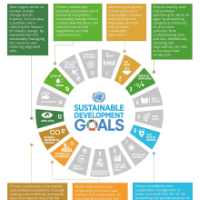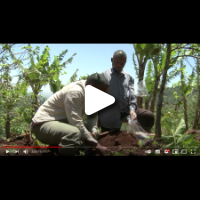Challenge 4 – How can we mitigate climate change through soil carbon management?
How can we manage land to increase soil carbon and mitigate climate change, whilst considering biodiversity restoration and increasing demands to feed growing populations?
Global soils are crucial for human health and wellbeing. They are complex, dynamic, varied and vulnerable super-systems that contribute to a vast range of Ecosystem Services and UN Sustainable Development Goals. They are reservoirs of hyper-biodiversity and multi-trophic interactions that underpin food security, nutrient cycling, water supply and climate mitigation.
More than 20% of global soils are degraded by overexploitation, climate change and pollution. Soil organic matter holds 80% of the carbon (~250,000 GT) contained in the global terrestrial biosphere, representing an important sink for atmospheric carbon dioxide (CO2) as a means to mitigate climate change. But, soil carbon is dynamic and influenced by many factors, making it difficult for farmers to accurately monitor soil carbon in the field.
As a result, the capacity for managed and unmanaged global soils to sequester more carbon through plant-soil interactions is uncertain and often hotly debated. We therefore have a number of challenges to address if we are to gain advantage from soil as a continued and enhanced sink for CO2. We need next-generation innovations that can include or combine scientific, technical, engineering, social, economic, engagement, local and global ideas and approaches.
Some potential starting questions for this Challenge are:
- How can we identify what the limits to soil carbon sequestration are?
- How does soil carbon contribute to soil biological health?
- How do we prevent further losses and identify where the greatest gains can be made?
- How can we use EO-geo-climatic, agronomic and biodiversity knowledge to target soil carbon management?
- How do we value the co-benefits of increasing soil organic matter in agricultural soils?
- How can we ensure that soil carbon management is delivering climate change mitigation?
Teams
Over the 3-day enviroSPRINT, Teams rapidly investigated their Challenge area, identified a key problem and innovated potential solutions. The Teams demonstrated a prototype of their solution to a panel of expert judges who assessed the novelty and feasibility of the concept, along with the quality of the presentation, and selected a winner (★). Alongside this, each Team produced a 90-second summary of their idea to share with a wider audience. These can be viewed on the Team pages:
Experts
We are grateful to have the support of our expert panel:
Andy Brown – Head of Sustainability at Anglian Water Services, Visiting Fellow of Practice at the Government Outcomes Lab, Blavatnik School of Government, University of Oxford
Andy is Head of Sustainability at Anglian Water Group and works with the board to oversee the delivery of their purpose, to bring environmental and social prosperity to the region we serve through our commitment to “Love Every Drop”. In addition to embedding sustainability throughout the business he has direct responsibility for the teams delivering six capital and UN SDGs thinking, community education, employee engagement & volunteering programmes and the Anglian Centre for Water Studies – a partnership with the University of East Anglia.
Matthew Orman – Executive Director & Public Affairs, Sustainable Soils Alliance (SSA)
Matthew is a Public Affairs Consultant of nearly 20 years’ experience with some of the country’s largest FMCG businesses including Nestle, Kraft, Danone, PepsiCo, Burger King and Weight Watchers. Much of his career was spent in Brussels where he worked in the European Commission and then European Parliament for former EPP Environment Spokesman, John Bowis, on many of the formative pieces of EU waste, water, recycling and air legislation. Matt brings his knowledge of the political and lobbying environment, as well as a specialism in environmental sustainability, to his work with the SSA. The SSA is a partnership of farming organisations, businesses, NGOs, applied science and academia working together to restore our soils to health within one generation.
Maria Spink
Maria is a social entrepreneur with a background in the financial sector and carbon finance. After working for 17 years in senior positions in international banking, Maria joined a tree planting and energy renewables company in East Africa as the Carbon Projects Director. Maria founded Lyra in 2012 in recognition of the impact when investing in girls’ and young women’s education and entrepreneurship. In addition, in 2012 Maria became the owner of a small SSSI in the Chiltern chalk hills that led her to be a “hobby” conservation grazier on the recommendation of Natural England. They started with 2 Dexter calves which have now grown into a small closed herd of 20. Through the SSSI Maria has learnt the importance of bringing back biodiversity and improving habitats for wildlife. The plant list of species stands at 220 and is increasing.
Dr Jeanette Whitaker – Plant-Soil Ecologist, UK Centre for Ecology and Hydrology (UKCEH)
Jeanette’s research focuses on the impacts of climate change and land-use change on terrestrial biogeochemical cycles and soil carbon storage, including use of 13C and 15N stable isotopes in studies of soil carbon dynamics. Jeanette also conducts applied research and knowledge exchange activities focused on the environmental costs and benefits of sustainable biomass for energy.
Challenge organisers
ENVISION Doctoral Training Partnership (DTP)

The ENVISION DTP brings together UK researchers with industry and NGO partners to provide a new generation of environmental scientists with the skills, knowledge and experience they need to take on the challenges of a changing world.
Funded by the Natural Environment Research Council (NERC), Lancaster University leads the initiative which includes the Universities of Nottingham and Bangor, the Centre for Ecology and Hydrology, the British Geological Survey and Rothamsted Research.
ENVISION research themes are broadly categorised into:
- Environmental change
- Sustainable use of natural resources
- Environmental hazards and risk
ENVISION provides students with opportunities to work with multiple research organisations exposing them to different research cultures, a wide cohort of peers, and offers the potential for new science and collaborations. A network of businesses offers employment experience either through an industrial placement, a CASE project or by working in one of the three Research Institutes.
UK Centre for Ecology and Hydrology (UKCEH)

UK Centre for Ecology & Hydrology (UKCEH)is an independent, not-for-profit research institute. The Centre’s scientists provide the data and insights that researchers, governments and businesses need to create a productive, resilient and healthy environment.
UKCEH research across six science areas:
- Atmospheric chemistry and effects
- Biodiversity
- Hydro-climate risks
- Pollution
- Soil and land use
- Water resources
UKCEH is a strategic delivery partner for the Natural Environment Research Council (NERC) providing National Capability for freshwater, terrestrial and near atmosphere science.





